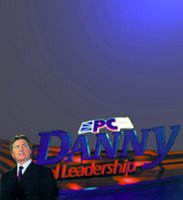Now three years later some of the observations made at the time seem so relevant that it is appropriate to reprint the original column. For those who may not be familiar with it, the title is a line from "Next to of course God America I", a poem by e.e. cummings that satirizes the vacuous rhetoric of American politicians and the gullibility of those who believe it.
next to of course god america iWilliams' speech was a masterpiece of cliche and hollow phrasing built around an assessment by government finances that was, to put it mildly, a feast of invention and make-believe. More accurately, one might call it a crock, a load or indeed just a flat-out pile of nonsense at least as far as its dismal projections for revenues were concerned.
love you land of the pilgrims' and so forth oh
say can you see by the dawn's early my
country 'tis of centuries come and go
and are no more what of it we should worry
in every language even deafanddumb
thy sons acclaim your glorious name by gorry
by jingo by gee by gosh by gum
why talk of beauty what could be more beaut-
iful than these heroic happy dead
who rushed like lions to the roaring slaughter
they did not stop to think they died instead
then shall the voice of liberty be mute?"
He spoke. And drank rapidly a glass of water
The five or six government communications people who cobbled the thing together with Danny himself actually had the phrase "short term pain for long term gain" in the drafts, apparently right up to the end. Only then did someone realize the line - lifted directly from John Crosbie's federal budget speech in December 1979 - was just a bit too familiar. They changed it to "short-term pain in return for long-term meaningful benefits." While that line got changed, Williams' affection for clusters of words devoid of meaning has only grown with time.
For some reason, Williams had neglected to produce the customary holiday messages from the Premier in 2004 so he began this speech with belated greetings and then proceeded to tell everyone the arse was supposedly out of 'er. The contrast between the giddy heights of optimism he had conjured during the election and and the depths of despair he engendered in this one speech - and how the whole policy came about - affected the operations of government for the next year or so. It was a bad speech, matched by a horrendous delivery.
As we have already noted, the shock to Williams' own ego from the subsequent drop in polling numbers led him to abandon entirely and unequivocally everything he committed to in this speech, except for the wage freezes. Once cash started rolling in though, Williams even delivered a modest salary increase beyond the ones negotiated at the back end of the public sector deals just ensure people forgot his January fiasco in 2004.
It may seem like the Williams' first speech was delivered a century ago, but it was not quite three years ago. Political trivia buffs will recall that in one interview after the speech, Williams referred to the authors of the financial report as PriceClubWaterhouseCoopers.
For your light, Sunday reading enjoyment here is a column originally published in early January 2004.
Outside the box:
he spoke. And rapidly drank a glass of water.
In his tribute to American poet e.e. cummings, Premier Danny Williams only said one thing we had not heard before: there will be no public sector wage increases for the next several years.
There were no other surprises in what the Premier said. All PriceWaterhouseCoopers did for their $100, 000 was take the 2003 budget, add forecasts from government officials and reprint them. The deficit now and in the future is too large to maintain and something must be done about it. They did remind us that, unlike the 1990s when the provincial economy was in deep recession, government will consistently have more money in the coming years. Add Voisey'’s Bay and increased oil exploration and things get better still. In other words, action is needed, but it doesn'’t have to be the drastic action forced on government by international circumstances a decade and more ago. Why the Premier chose to freeze wages and portray a difficult situation as desperate is the question to be answered.
Any competent public relations professional will tell you that communications are judged not by the telling but by the doing.
Maybe there is some half-baked strategy that by re-creating the situation in 1933, the federal government will pour money into the province. Don'’t count on it for a whole bunch of reasons, not the least of which is that the facts make it clear that we are not now, nor are we likely to be bankrupt.
What the Premier did last week, though, was demonstrate that his government has not yet figured out what it is going to do. It appeared that in all the talk about "“growing the economy"” with a New Approach, capitalization is more than an innovative use of the shift key. Apparently not.
What the Premier also did was send the provincial economy into a downturn, despite knowing from government officials that strong consumer confidence has been a key part of government'’s income to date and will continue to be. With a handful of words, he made the province'’s deficit bigger and therefore worsened the situation he already claimed was shocking and beyond belief. That claim is nonsense.
By some accounts, the Premier also showed us that he is prepared to bypass his caucus and his cabinet in announcing the wage freeze. Just as he kept the Blue Book a secret from his party until the second it was made public, he apparently kept the wage freeze a closely guarded secret as well. One suspects that Loyola Sullivan has not been able to give even the most basic details of the freeze not because of cabinet confidence, but because the Premier hasn'’t told him yet what they are.
It's bad enough that cabinet may not yet have reached a decision on how it plans to deal with the province'’s financial situation. We simply don't know why Danny Williams made his announcement this week in the way he did. If the Premier indeed made a unilateral decree on wage freezes - a decree - – then that is a problem looming within the government with implications for us all that are indeed shocking and beyond belief.
The odd thing about public relations is that the more you say something without doing it, the less you will be believed. Count the number times Loyola Sullivan and the Premier insisted last week that they are being straight with people, laying out the facts, being open, honest and accountable.
Count how many times they said they have a plan.







